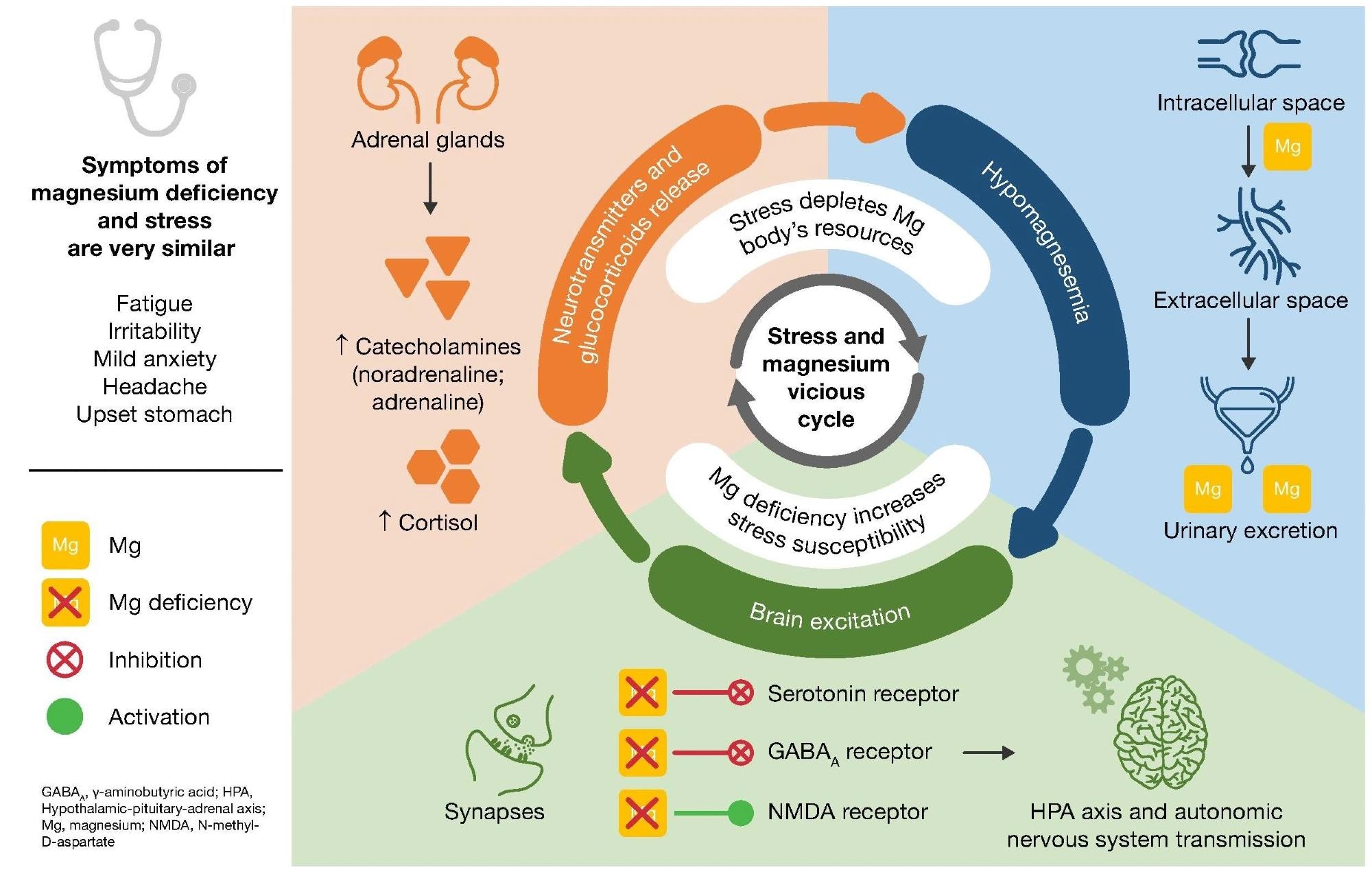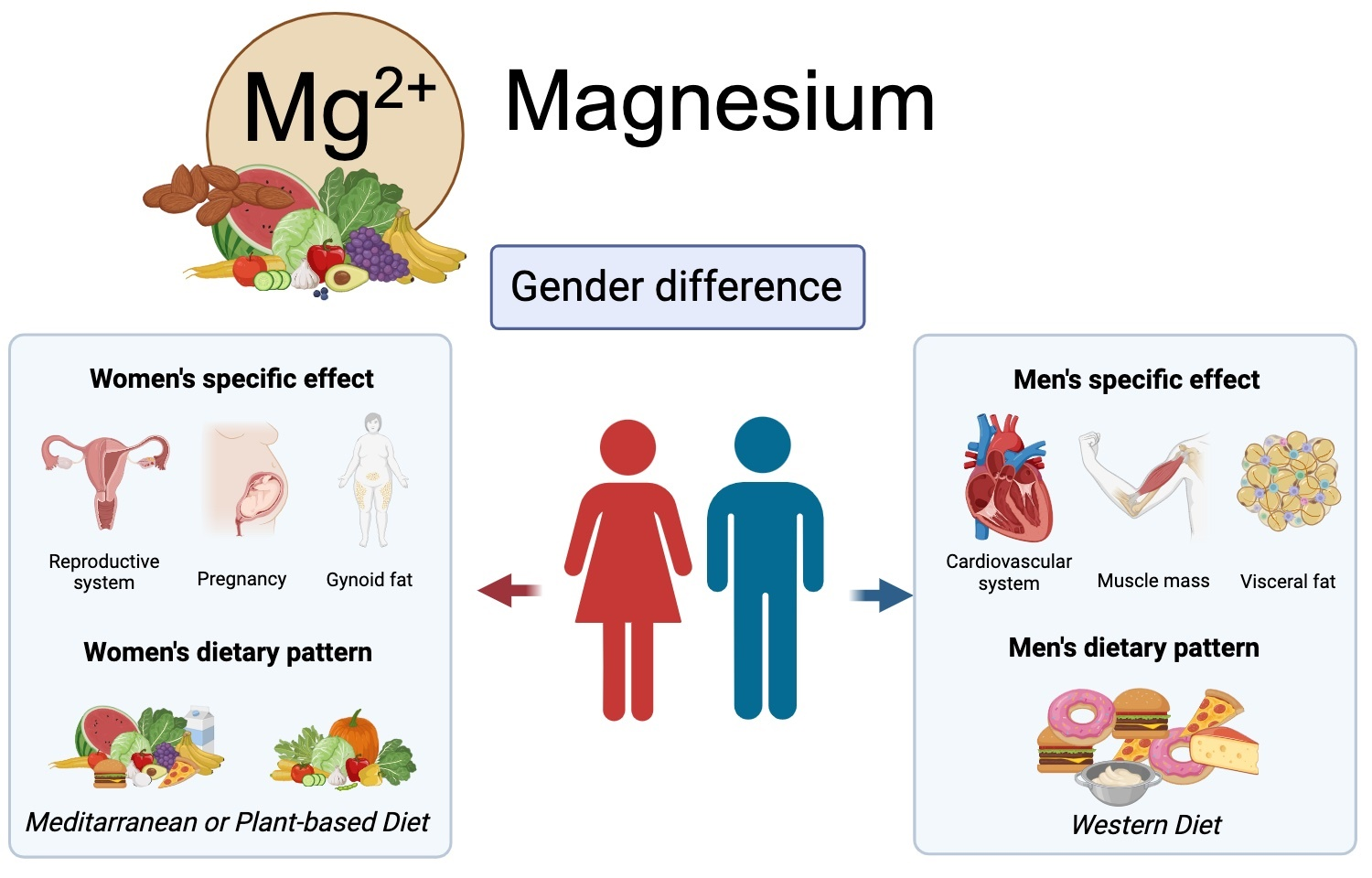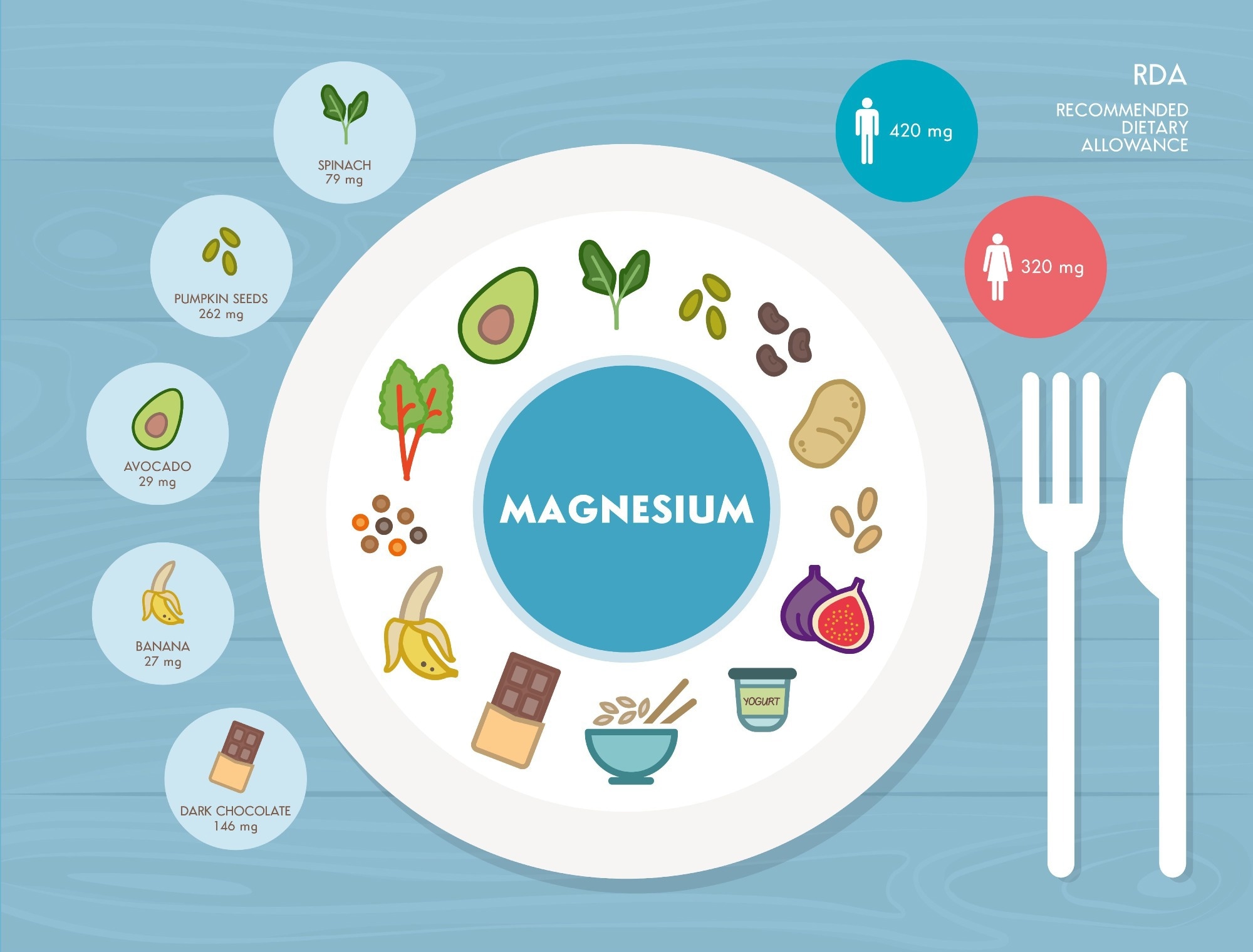Introduction
Health benefits of magnesium
Foods rich in magnesium
Recommended intake and deficiency risks
Safety and excess intake
Conclusions
References
Further reading
This article explains why magnesium matters for muscle, nerve, heart, bone, sleep, and metabolic health, and pinpoints the best food sources to meet daily needs.
 Image Credit: Tatjana Baibakova / Shutterstock.com
Image Credit: Tatjana Baibakova / Shutterstock.com
Introduction
Magnesium is the fourth most abundant mineral in the body and an essential cofactor in over 300 enzymatic reactions. Magnesium supports protein and nucleic acid synthesis, energy production, glucose metabolism, neuromuscular signaling, and cardiovascular regulation.1,
The human body cannot produce magnesium on its own; therefore, maintaining adequate dietary intake of magnesium is crucial for overall health. This article explores the diverse range of both plant- and animal-based sources of magnesium, as well as the clinical significance of maintaining sufficient magnesium levels.
Health benefits of magnesium
Magnesium in muscle and nerve function
By acting as a natural calcium channel blocker and N-methyl-D-aspartate (NMDA) receptor antagonist, magnesium stabilizes neuronal signaling and promotes muscle relaxation. Evidence syntheses emphasize magnesium’s role in neuromuscular function; however, specific dosing claims for improving muscle performance or alleviating pregnancy-related cramps vary across studies and should be interpreted with caution.2,18
Within mitochondria, magnesium is crucial for adenosine triphosphate (ATP) synthesis and binds to ATP to form bioactive Mg-ATP. Magnesium also supports oxygen utilization during exercise, endurance capacity, and overall energy metabolism.1,5
Stress and mental health
Magnesium influences psychoneuroendocrine pathways, wherein it modulates the hypothalamic-pituitary-adrenal (HPA) axis to reduce adrenocorticotropic hormone (ACTH) and cortisol secretion under stress. This micronutrient also acts as an NMDA antagonist, potentiates γ-aminobutyric acid (GABA) activity to reduce neuronal hyperexcitability, and promotes brain-derived neurotrophic factor (BDNF) to support neuroplasticity.3,5
Magnesium is essential for serotonin synthesis, underscoring its role in mood regulation and antidepressant effects. In fact, low magnesium levels are prevalent among individuals experiencing chronic stress and sleep disturbances.2,4

Symptoms of magnesium deficiency and stress are very similar.4
A recent systematic review of 18 studies reported that daily magnesium supplementation reduced subjective anxiety in individuals more likely to experience stress, pre-menopausal syndrome (PMS), or hypertension. Among elderly diabetic patients, 450 mg/day magnesium was equally as effective as 50 mg/day of imipramine in alleviating depression.1 Meta-analytic data in adults with depressive disorders also show a significant reduction in depression scores with magnesium supplementation.6
Sleep quality
Magnesium supports sleep by enhancing GABAergic signaling to promote relaxation and increasing melatonin synthesis, which improves the alignment of circadian rhythms. Together, these actions help maintain sleep quality and stability.3
Observational evidence from the Coronary Artery Risk Development in Young Adults (CARDIA) study suggests an association between higher magnesium intake and both improved sleep quality and reduced risk of short sleep duration.3 Similar results were observed in a randomized controlled trial, wherein magnesium bisglycinate supplementation modestly improved insomnia severity among healthy adults with a history of poor sleep quality.9 Given that insomnia affects over 50% of older adults2, these findings highlight the potential utility of magnesium as a targeted intervention in this population. Additional randomized and longer trials with objective sleep measures are warranted.
Cardiovascular and bone health
Magnesium contributes to vascular function by enhancing nitric oxide production, reducing vascular tone, and lowering blood pressure. Likewise, a recent meta-analysis reports that supplementation of over 400 mg/day of magnesium for at least 12 weeks significantly reduced systolic and diastolic blood pressure by 6.38 mmHg and 3.71 mmHg, respectively.10
Peri- and postcardiac settings: Intravenous magnesium is effective and safe for preventing or treating postcardiac atrial fibrillation (AF) and other arrhythmias in specific settings. Pooled analyses indicate lower rates of ventricular and supraventricular arrhythmias with magnesium compared to placebo.13
Metabolic and cardiometabolic outcomes: Prospective cohorts have associated higher dietary magnesium intake with a lower risk of type 2 diabetes in a dose–response manner, and randomized trials have suggested improvements in glucose parameters in individuals with or at risk of diabetes.15,16
Magnesium is vital for bone health, as it regulates the activity of osteoblasts and osteoclasts, supports the activation of vitamin D, and maintains calcium balance. Low serum magnesium levels have been associated with a higher long-term risk of major fractures in cohort studies, underscoring the importance of maintaining adequate magnesium status for skeletal health.14
The benefits of magnesium and how to add it into your diet
Foods rich in magnesium
Leafy greens, such as spinach and Swiss chard, provide 70-80 mg/serving, while legumes like kidney beans and lentils, as well as whole grains like brown rice, quinoa, and oats, and fiber-rich foods, also significantly contribute to daily intake.18
Nuts and seeds are particularly rich in magnesium, of which include pumpkin seeds (~156 mg per 28 g; ≈550 mg/100 g), almonds (~80 mg per 28 g), and cashews (~74 mg per 28 g). Thus, a 30 g serving of pumpkin seeds provides approximately 165 mg, a significant contribution, but not sufficient on its own to meet adult daily requirements. Other plant-based sources of magnesium include avocados, bananas, and dark chocolate.2,5
Fatty fish like mackerel and salmon are notable animal sources of magnesium, in addition to dairy products like milk and yogurt. While lower in concentration, these foods can complement plant-based sources in a balanced diet.2,18
Phytates and oxalates in legumes and grains can bind magnesium; however, soaking, sprouting, or fermenting can improve its bioavailability. Serum and whole-body magnesium balance also depend on the overall quality of the diet and kidney function; there is no universally recommended “2:1” calcium-to-magnesium ratio for optimal absorption.18
Table 1. List of foods and food groups from plant and animal origin with their corresponding magnesium content (mg/100 g edible food).
| Food From Plant Origin |
Food From Animal Origin |
| Item / Group |
Mg (mg/100 g) |
Item / Group |
Mg (mg/100 g) |
| Nuts and seeds |
|
Dairy and eggs |
|
| Pumpkin seeds, dried |
592 |
Parmesan cheese |
44 |
| Flaxseed |
392 |
Feta cheese |
19 |
| Sesame seeds, roasted |
356 |
Whole-fat milk |
13 |
| Almonds, raw |
270 |
Plain whole-fat yogurt |
12 |
| Cashew nuts, roasted |
260 |
Whole fresh egg |
12 |
| Walnuts |
158 |
|
|
| Pistachio nuts, roasted |
109 |
|
|
| Legumes |
|
Fish and seafood |
|
| Peanuts, roasted |
178 |
Cod, cooked |
133 |
| Soybeans, cooked |
86 |
Salmon, cooked |
122 |
| Chickpeas, cooked |
48 |
Canned anchovies |
69 |
| Kidney beans, cooked |
45 |
Shrimps, cooked |
37 |
| Lentils, cooked |
36 |
|
|
| Vegetables and fruits |
|
Meat and meat products |
|
| Sun-dried tomatoes |
194 |
Chicken breast, cooked |
34 |
| Spinach, cooked |
87 |
Turkey, cooked |
32 |
| Kale, cooked |
57 |
Veal, cooked |
34 |
| Dates |
54 |
Rabbit, cooked |
21 |
| Fresh parsley |
50 |
|
|
| Baked potatoes with skin |
43 |
|
|
| Whole grains |
|
|
|
| Buckwheat flour |
251 |
|
|
| Amaranth grain |
248 |
|
|
| Quinoa grain |
197 |
|
|
| Oats |
177 |
|
|
| Spelt |
136 |
|
|
| Barley |
133 |
|
|
| Data obtained from the US Department of Agriculture (USDA), Nutrient Database for Standard Reference, Release 28. 12 |
Recommended intake and deficiency risks
For children between the ages of 0 and 6 months, the Recommended Dietary Allowance (RDA) for magnesium is 30 mg/day. Children between 7 and 12 months of age are advised to consume 75 mg/day of magnesium. Throughout childhood, magnesium requirements increase from 80 mg/day between the ages of one and three years to 130 mg/day and 240 mg/day for children aged four to eight and nine to 13 years, respectively.18
Magnesium RDAs of 400 mg/day and 310 mg/day are recommended for adult men and women, respectively. Importantly, these recommendations may vary by region, with the European Food Safety Authority (EFSA) recommending 350 mg/day and 300 mg/day magnesium for men and women, respectively.5,18

Gender differences in magnesium's health impact and dietary intake.5
Serum magnesium levels are tightly regulated and reflect only a small fraction of total body stores; hypomagnesemia is commonly defined as <0.75 mmol/L (normal ≈0.75–0.95 mmol/L). Clinical features can include fatigue, irritability, arrhythmias, and neuromuscular signs such as tremors or cramps; severe deficiency can precipitate seizures or dangerous rhythm disturbances.18
At-risk groups include older adults, as these individuals often have reduced intestinal absorption and a higher prevalence of chronic disease. Patients diagnosed with gastrointestinal disorders like Crohn’s disease or celiac disease, which impair absorption.
High alcohol intake, uncontrolled diabetes, as well as the use of diuretics, antibiotics, and antacids, can accelerate magnesium loss. Reliance on highly processed Western diets, which are low in whole grains, legumes, and greens, further contributes to subclinical deficiency.4,5,18
 Image Credit: elenabsl / Shutterstock.com
Image Credit: elenabsl / Shutterstock.com
Safety and excess intake
Dietary magnesium is generally safe; however, excess intake can occur during supplementation. Higher daily intakes have been reported among vegans and vegetarians as compared to omnivores, suggesting plant-based diets may better support adequate magnesium intake.17
The Institute of Medicine (IOM) has determined that 350 mg/day is a tolerable upper intake level (UL) for supplemental magnesium, above which gastrointestinal side effects, such as diarrhea, nausea, and abdominal cramping, may occur. Individuals with kidney impairment are at an increased risk of toxicity.18
Although rare, marked hypermagnesemia can cause hypotension, lethargy, arrhythmias, and, in extreme cases, cardiac arrest; risk is greatest with impaired renal function and very high supplemental or medicinal magnesium exposure.18
Conclusions
Magnesium is essential for stress modulation, restorative sleep, and cardiovascular stability; however, intake remains inadequate in most individuals due to dietary patterns and lifestyle factors. Subclinical magnesium deficiency increases the risk of stress-related disorders, sleep disturbances, hypertension, and arrhythmias, thus emphasizing the clinical importance of this element.
Prioritizing the consumption of magnesium-rich foods, such as whole grains, legumes, leafy greens, nuts, and seeds, is crucial for preventing disease and maintaining health. In patient populations at a greater risk of deficiency or with increased physiological demands, careful monitoring of magnesium status and judicious supplementation under medical supervision are required to optimize long-term health outcomes.
References
- Boyle, N. B., Lawton, C., & Dye, L. (2017). The Effects of Magnesium Supplementation on Subjective Anxiety and Stress: A Systematic Review. Nutrients 26(9). DOI:10.3390/nu9050429, https://www.mdpi.com/2072-6643/9/5/429.
- Schwalfenberg, G. K., & Genuis, S. J. (2017). The Importance of Magnesium in Clinical Healthcare. Scientifica 1; 4179326. DOI:10.1155/2017/4179326, https://www.hindawi.com/journals/scientifica/2017/4179326/.
- Zhang, Y., Chen, C., Lu, L., et al. (2022). Association of magnesium intake with sleep duration and sleep quality: findings from the CARDIA study. Sleep 45(4):zsab276, DOI:10.1093/sleep/zsab276, https://academic.oup.com/sleep/article/45/4/zsab276/6432454
- Pickering, G., Mazur, A., Trousselard, M., et al. (2020). Magnesium Status and Stress: The Vicious Circle Concept Revisited. Nutrients 12(12); 3672. DOI:10.3390/nu12123672, https://www.mdpi.com/2072-6643/12/12/3672.
- Mazza, E., Maurotti, S., Ferro, Y., et al. (2025). Magnesium: Exploring Gender Differences in Its Health Impact and Dietary Intake. Nutrients 17(13); 2226. DOI:10.3390/nu17132226, https://www.mdpi.com/2072-6643/17/13/2226.
- Moabedi, M., Aliakbari, M., Erfanian, S., & Milajerdi, A. (2023). Magnesium supplementation beneficially affects depression in adults with depressive disorder: A systematic review and meta-analysis of randomized clinical trials. Frontiers in Psychiatry 14; 1333261. DOI:10.3389/fpsyt.2023.1333261, https://www.frontiersin.org/articles/10.3389/fpsyt.2023.1333261/full.
- Wienecke, E. & Nolden, C. (2016). Long-term HRV analysis shows stress reduction by magnesium intake. MMW Fortschr. Med. 158,12-16. DOI:10.1007/s15006-016-9054-7, https://link.springer.com/article/10.1007/s15006-016-9054-7.
- Pouteau, E., Kabir-Ahmadi, M., Noah, L., et al. (2018). Superiority of magnesium and vitamin B6 over magnesium alone on severe stress in healthy adults with low magnesemia: A randomized, single-blind clinical trial. PLoS ONE 13. DOI:10.1371/journal.pone.0208454, https://journals.plos.org/plosone/article?id=10.1371/journal.pone.0208454.
- Schuster, J., Cycelskij, I., Lopresti, A., & Hahn, A. (2025). Magnesium Bisglycinate Supplementation in Healthy Adults Reporting Poor Sleep: A Randomized, Placebo-Controlled Trial. Nature and Science of Sleep, 17, 2027. DOI:10.2147/NSS.S524348, https://www.tandfonline.com/doi/full/10.2147/NSS.S524348
- Alharran, A. M., Alzayed, M. M., Jamilian, P., et al. (2023). Impact of Magnesium Supplementation on Blood Pressure: An Umbrella Meta-Analysis of Randomized Controlled Trials. Current Therapeutic Research 101; 100755. DOI:10.1016/j.curtheres.2024.100755, https://www.sciencedirect.com/science/article/pii/S0011393X24000250.
- Chrysant, S. G., & Chrysant, G. S. (2019). Association of hypomagnesemia with cardiovascular diseases and hypertension. International Journal of Cardiology Hypertension, 1, 100005. DOI:10.1016/j.ijchy.2019.100005, https://www.sciencedirect.com/science/article/pii/S2590086219300059
- Rosique-Esteban, N., Guasch-Ferré, M., Hernández-Alonso, P., & Salas-Salvadó, J. (2018). Dietary Magnesium and Cardiovascular Disease: A Review with Emphasis in Epidemiological Studies. Nutrients 10(2); 168. DOI:10.3390/nu10020168, https://www.mdpi.com/2072-6643/10/2/168.
- Salaminia, S., Sayehmiri, F., Angha, P., et al. (2018). Evaluating the effect of magnesium supplementation and cardiac arrhythmias after acute coronary syndrome: a systematic review and meta-analysis. BMC Cardiovascular Disorders 18(129). DOI:10.1186/s12872-018-0857-6, https://bmccardiovascdisord.biomedcentral.com/articles/10.1186/s12872-018-0857-6.
- Kunutsor S. K., Whitehouse M. R., Blom A. W., & Laukkanen J. A. (2017). Low Serum Magnesium Levels are Associated with Increased Risk of Fractures: A Long-Term Prospective Cohort Study. European Journal of Epidemiology 32:593-603. DOI:10.1007/s10654-017-0242-2, https://link.springer.com/article/10.1007/s10654-017-0242-2.
- Fang, X., Han, H., Li, M., Liang, C., Fan, Z., Aaseth, J., He, J., Montgomery, S., & Cao, Y. (2016). Dose-Response Relationship between Dietary Magnesium Intake and Risk of Type 2 Diabetes Mellitus: A Systematic Review and Meta-Regression Analysis of Prospective Cohort Studies. Nutrients, 8(11), 739. DOI:10.3390/nu8110739, https://www.mdpi.com/2072-6643/8/11/739
- Veronese, N., Watutantrige-Fernando, S., Luchini, C., et al. (2016). Effect of magnesium supplementation on glucose metabolism in people with or at risk of diabetes: A systematic review and meta-analysis of double-blind randomized controlled trials. European Journal of Clinical Nutrition 70(12); 1354-1359. DOI:10.1038/ejcn.2016.154, https://www.nature.com/articles/ejcn2016154.
- Neufingerl N. & Eilander A. (2021). Nutrient Intake and Status in Adults Consuming Plant-Based Diets Compared to Meat-Eaters: A Systematic Review. Nutrients 14(29). DOI:10.3390/nu14010029, https://www.mdpi.com/2072-6643/14/1/29.
- Magnesium. [Online]/ Available from: https://ods.od.nih.gov/factsheets/Magnesium-HealthProfessional/.
Further Reading
Last Updated: Sep 28, 2025